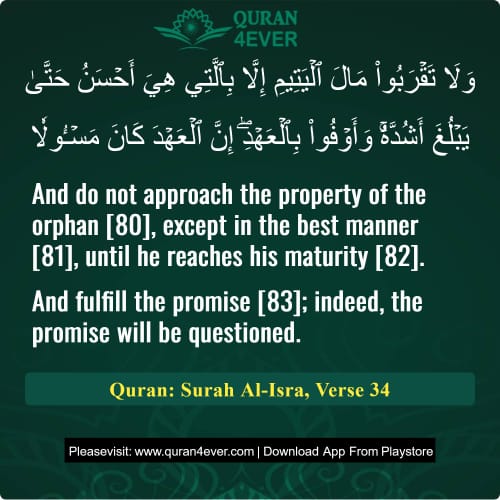
Transliteration:( Wa laa taqraboo maalal yateemi illaa billatee hiya ahsanu hattaa yablugha ashuddah; wa awfoo bil'ahd, innal 'ahda kaana mas'oolaa )
"And do not approach the property of the orphan [80], except in the best manner [81], until he reaches his maturity [82]. And fulfill the promise [83]; indeed, the promise will be questioned."
From this we learn that if the heirs of a deceased person are minors, then the wealth of the deceased should not be used for things like Fateha food, etc., as this food would not be lawful for anyone.
Wealth for such commendable deeds should be spent by the adult heirs from their own share.
To devour the wealth of orphans is equivalent to devouring the fire of Hell.
People are often unmindful of this severe warning.
Even making an orphan fetch water, when that water is bought with his wealth, is wrong.
From this we learn that a guardian can engage in trade with an orphan’s wealth if it is done for the orphan’s benefit and leads to its increase.
Similarly, depositing the money in a bank account under the orphan’s name for safekeeping is also considered part of acting in a good and careful manner.
The age range from 12 to 18 years is generally considered the period of puberty or adolescence.
However, the final legal verdict in Islamic law, according to Imam Muhammad and Imam Abu Yusuf, is that after completing the fifteenth year, a person is considered mature.
Hence, once a person reaches the age of puberty, he is no longer termed an orphan.
This includes all types of promises—whether made to:
Allah Almighty,
The Holy Prophet ﷺ,
A religious guide,
A teacher,
Relatives,
Or even a stranger.
34. And come not near to the orphan’s property except to improve it, until he attains the age of full strength. And fulfill (every) covenant. Verily, the covenant will be questioned about. 35. And give full measure when you measure, and weigh with a balance that is straight. That is good (advantageous) and better in the end.
(And come not near to the orphan’s property except to improve it, until he attains the age of full strength.) meaning, do not dispose of the orphan’s wealth except in a proper manner.
(but consume it ﴿the orphan’s property﴾ not wastefully and hastily fearing that they should grow up, and whoever (among guardians) is rich, he should take no wages, but if he is poor, let him have for himself what is just and reasonable (according to his labor).) ﴿4:6﴾ In Sahih Muslim it is recorded that the Messenger of Allah said to Abu Dharr:
(O Abu Dharr, I see that you are weak (in adiministering), and I like for you that which I like for myself. Do not let yourself be appointed as Amir over two people, and do not let yourself be appointed as guardian of an orphan’s property.)
(And fulfill (every) covenant.) meaning, everything that you promise people, and the covenants that you agree to, because the person who makes a covenant or a promise will be asked about it:
(Verily, the covenant will be questioned about.)
(And give full measure when you measure.) meaning, do not try to make it weigh less nor wrong people with their belongings.
(and weigh with a balance) meaning scales,
(that is straight.) meaning that which is not distorted nor that which will cause confusion.
(that is good) for you, in your daily life and in your Hereafter. So Allah says:
(and better in the end.) meaning, with regard to your ultimate end in the Hereafter.
(That is good (advantageous) and better in the end.) Sa`id narrated that Qatadah said that this means “Better in reward and a better end. ” Ibn `Abbas used to say: “O people, you are entrusted with two things for which the people who came before you were destroyed – these weights and measures.”
(17:34) (x) And do not even go near the property of the orphan – except that it be in the best manner – till he attains his maturity.[38] (xi) And fulfil the covenant, for you will be called to account regarding the covenant.[39]
38. This too, was not merely a moral instruction. When the Islamic state was established, legal and administrative methods were adopted to safeguard the rights of orphans, the details of which are found in the literature of Hadith and Fiqh. Then this principle was extended to cover the cases of all those citizens who were unable to safeguard their own rights. The Prophet (peace be upon him) himself declared: I am the guardian of the one who has no guardian. And this is the basis of many rules and regulations of the Islamic law.
39. Fulfillment of pledges was not meant to be merely a moral instruction for individuals but afterwards when the Islamic state was established, this became the guiding principle for the conduct of all internal; and external affairs by the Muslim community and the Islamic government.
[744]- i.e., to improve or increase it.

For a faster and smoother experience,
install our mobile app now.
Related Ayat(Verses)/Topics